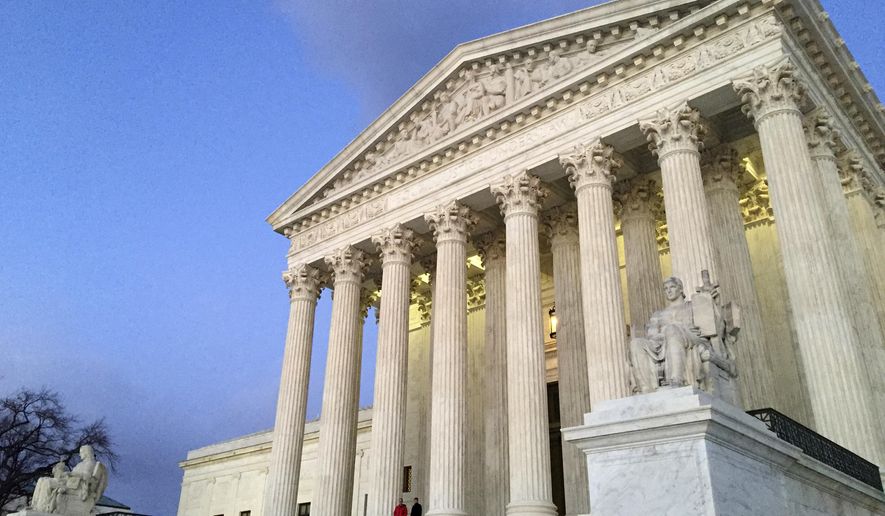OPINION:
Recently, I had the privilege of sitting in the Rose Garden on the occasion of the National Day of Prayer in the United States as President Trump signed his noteworthy executive order establishing the White House Faith and Opportunity Initiative.
Amid the prayers of various faith leaders — including an orthodox rabbi and a Hindu priest — and in the presence of Cabinet members, Mr. Trump unveiled the new initiative.
“The faith initiative will help design new policies that recognize the vital role of faith in our families, our communities and our great country,” the president said to those of us present. “This office will also help ensure that faith-based organizations have equal access to government funding and the equal right to exercise their deeply held beliefs.”
In fact, the order goes as far as empowering faith groups to notify the attorney general’s office of any failures from the Executive Branch to uphold religious liberty protections. If anyone suspected Mr. Trump of only paying lip service to the faith community, this executive order has the potential to quell their skepticism once and for all.
Not everybody was so pleased, though.
One group that advocates for secularism in America called the order a “blow to the Constitution.” Certain civil rights groups characterized it as another excuse to discriminate and questioned whether it will actually invite other faiths to participate.
Coming from India — one of the most devout nations on Earth — I’m perplexed by the blatant disregard of many Americans toward the value of faith and its place in the public square.
Did they forget that the First Amendment freedoms they enjoy — the right to free speech and religion — originated in a Judeo-Christian worldview? Just last year the world celebrated the 500th anniversary of the Protest Reformation. It was Protestantism that laid the foundation for the West, including its high regard for individual rights.
Moreover, most Americans have a shortsighted interpretation of separation of church and state, and how it’s viewed in other cultures.
Just take a look at African-American churches. In these churches, there is no artificial separation between the spiritual and secular. African-American bishops and clergy speak freely of politics and social justice because they see these issues intertwined with their faith, an example they learned from the great Martin Luther King Jr. and all who were involved in the civil rights movement.
The biggest flaw in liberal America’s interpretation of separation of church and state is assuming secularism means the absence of religion — when in reality it’s the opposite. Secularism means neutrality toward religion or, as in the vernacular of the U.S. Constitution, that there should be no “established” religion. A truly secular society should result not in the exclusion of faith, but in the equal inclusion of all faiths. My native India, which also establishes freedom of religion in its constitution, could learn from America’s ever-present struggle for religious freedom for all.
Ahead of the upcoming general elections in India, the archbishop of Delhi, Anil Cuoto, released a pastoral letter to his diocese asking the members to pray and fast. Anyone who has been following the stories of attacks on Christians, hate crimes against Muslims, Dalits and women and the threats by extremists against free speech knows India is in desperate need of prayers.
“We are witnessing a turbulent political atmosphere which poses a threat to the democratic principles enshrined in our constitution and the secular fabric of our nation,” wrote Archbishop Cuoto. “It is our hallowed practice to pray for our country and its political leaders all the time, but all the more when we approach the general elections.”
The archbishop simply asked his flock to pray — he didn’t express support for any specific political party. Nevertheless, the letter triggered a media-driven public outcry against the Catholic Church. Some politicians accused the archbishop of rallying Christians to vote against the Bharatiya Janata Party (BJP), Prime Minister Narendra Modi’s party. One member of Parliament even blamed the Vatican for being behind the letter and called for a cut to diplomatic relations with the Holy See.
The underlying theme of the commotion was that the Indian church had no business speaking about social and political issues related to faith. Some politicians even believe Christianity is not an Indian religion, though it has been in the subcontinent for 2,000 years.
One cannot miss the irony in this reaction. The Rashtriya Swayamsevak Sangh — widely considered the BJP’s parent organization — is a Hindu religious social group heavily involved in politics. There are more Hindu ascetics and monks in Parliament than other religions. There’s even a Hindu ascetic serving as the chief minister of Uttar Pradesh.
The problem America and India share is not religion encroaching into state or vice versa, but a lack of true pluralism. The job of a secular government is to invite all faiths to participate in making their communities better.
• Joseph D’Souza is the moderating bishop of the Good Shepherd Church and Associated Ministries of India. He also serves as the president of the All India Christian Council.




Please read our comment policy before commenting.